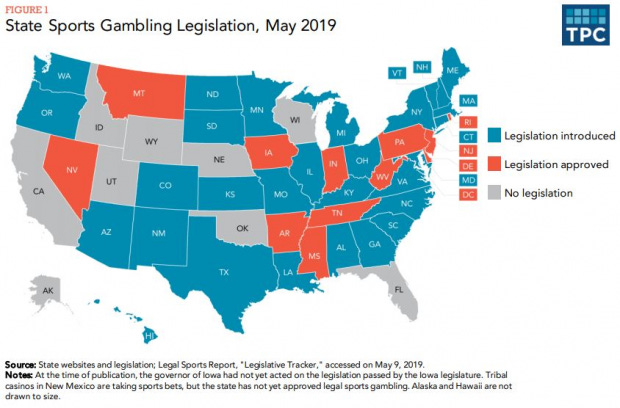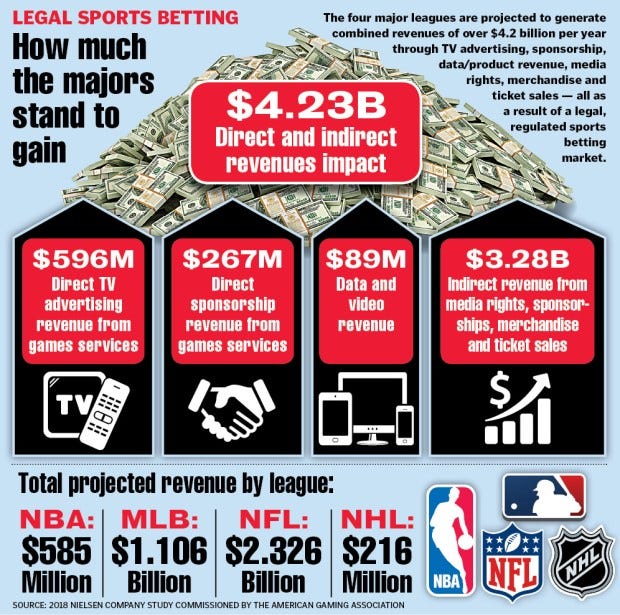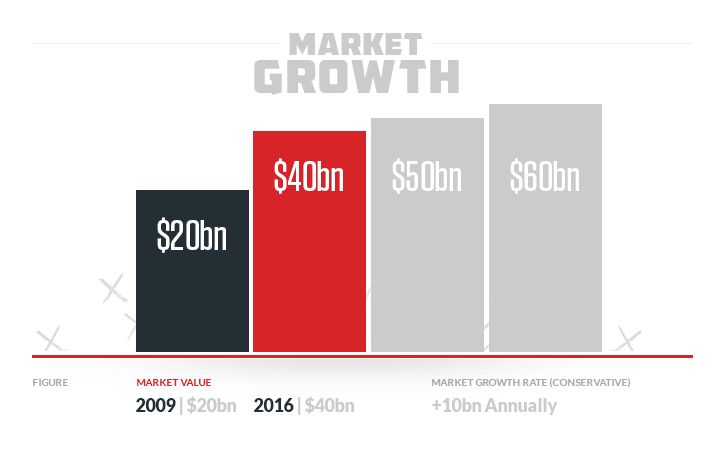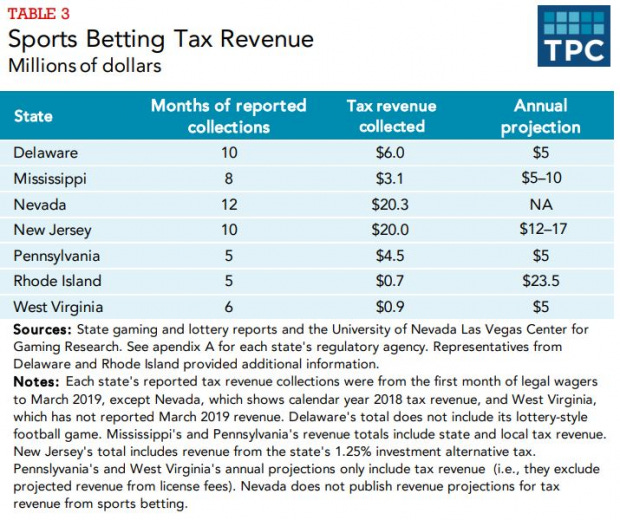Is betting with players’ live performance data the future?
This weekend the XFL introduced a live on-screen betting feature as part of their live experience. The idea? Enables fans to bet in real time while watching an XFL game.
More precisely, during XFL games on ABC and ESPN, the “score bug” displayed feature both the betting point spread and the over/under for the game.
It is worth pointing out that the “score bug” only featured those two popular football bets, but also the traditional things viewers are used to seeing: the score, game clock, down, and distance.
This initiative by the XFL is part of a new big trend in the world of elite sports. Live betting has gain great traction over the years as it present a new revenue opportunity for the leagues, local states, and fans. In this analysis, we will talk about the size of the sports betting market as well as future technology trends that will impact this market.
So how big is the global sports betting market?
International sports betting is estimated to have a market capitalization of $250B. According to Statista, licensed online sportsbooks (like the ones we review) account for upwards of $39.7B of this revenue.
The rest of these sports bets are staked at venues like casinos, at horse tracks, or other global conduits.
The US sports betting market is the world’s fastest growing sports betting market
In 2009, the sports betting market was valued at $20B. By 2016, it was valued at $40B.
With a present market capitalization of (conservatively) between $60-73B, the market has conservatively grown at a rate of $10B per year.
If this pace continues, American sports betting will occupy an increasingly significant share of the world market.
According to a recent Statista survey, over 50% of US citizens admitted to placing a bet on a sporting event at least once in their life.
Throughout 2019, Americans legally wagered a record $13B, according to data from the American Gaming Association. That is nearly double the $6.6B that was wagered legally across the U.S. in 2018.

The handles seen by each state with legalized sports betting in 2019, via the AGA:
- Arkansas: $11 million
- Delaware: $103 million
- Indiana: $436 million
- Iowa: $212 million
- Mississippi: $369 million*
- Nevada: $5.3 billion
- New Hampshire: Sports betting launched 12/30/2019
- New Jersey: $4.6 billion
- New Mexico: N/A*
- New York: N/A*
- Oregon: $45 million*
- Pennsylvania: $1.5 billion
- Rhode Island: $246 million
- West Virginia: $226 million
How many states have legalized sports betting in the US?
As shown in the table below, according to David Forman, the senior director of research at the American Gaming Association, 18 to 20 states in total could have sports betting in place a year from now.
Here’s where each state stands on legal sports betting:
 How much money do US states make from Sports Betting Tax revenue?
How much money do US states make from Sports Betting Tax revenue?
A new report published by Richard C. Auxier of the Tax Policy Center finds that just over half the states that now allow sports betting are in line to meet their tax revenue projections.
Some states, most notably New Jersey, which allows online wagers, are set to far exceed their projections, while others, like Rhode Island, are falling well short. Officials say the shortfalls are likely the result of limited online gambling options and low consumer awareness of legal sports betting in those states, according to Bloomberg Tax.
Auxier’s report also notes that none of the state revenue projections for sports gambling revenue came close to representing 1% of annual general revenue.
“States can collect millions of dollars in tax revenue from legal sports betting, but that tax revenue will always be relatively small and volatile,” it says. “As such, politicians should not overpromise what the revenue will do for state budgets, and legislators absolutely should not make critical spending programs dependent on that revenue.”
The National Basketball Association and DraftKings announced a multiyear partnership that will make DraftKings an authorized sports betting operator of the league. And BetIndiana and Sportradar, the provider of sports data and content, inked a partnership to bring Sportradar’s real-time sports data and managed trading services to BetIndiana’s mobile sportsbook.
So how much are US major leagues expected to gain from sports betting in the coming years?
As shown in the graph below, the four major leagues (NBA, NFL, NHL, MLB) are projected to generate a combined revenues of $4.2B per year through TV advertising, sponsorship, data/product revenue, media rights, merchandise and ticket sales all as a result of a legal, regulated sports betting market.
Indirect revenue from media rights, merchandise and ticket sales are expected to be the biggest revenue segment with $3.28B in projected revenue.
Among the major sports leagues, the NFL is expected to be the biggest earner with $2.3B in projected revenue from sports betting in the coming years.
 What are the most popular sports bets around the world?
What are the most popular sports bets around the world?
Soccer is the most popular sports as it has, by far, the greatest betting volume, closely followed by American football. The other big three North American leagues (MLB, NBA, NHL) receive a significant amount of betting volume, too.
Horse racing, while often categorized as a niche market, still receives heavy betting volume in the US, UK, France, Australia, and South Africa, which are all sizeable markets.
eSports is the “fastest” growing market in regards to “betting volume”
In terms of betting volume, eSports is the fastest-growing sports betting market today. The games may range from Starcraft to Player Unknown Battlegrounds. The global eSports market passed the $1B market in revenue last year, and is projected to create upwards of $1.5B in 2020.
According to a senior analyst at the market research firm Technavio, the increased popularity of esports is pushing bookmakers to allow bets on many different esports matches, now including golf, tennis, and rugby. This growing volume is driving revenue generation across the sports betting industry.
As esports transform from a budding industry to a more fully-formed, established one, it will generate a significant revenue stream for the broader sports betting market.
What will be the future of sports betting?
The digital revolution (internet, mobile..) has been a key factor to drive the popularity of sports betting. In fact, the massive projected growth figures for sports betting are in large part due to the proliferation of internet around the world, and sportsbooks’ subsequent investment in their digital platforms, as a response to the demand for online sports betting. It’s never been easier for people around the globe to connect to the internet, and subsequently, start betting via sportsbooks.
The penetration of digital sports betting goes beyond laptops and desktops. Last year, 45% of sports betting took place via mobile.
So which emerging technologies beyond mobile will impact sports betting?
We believe that several emerging technologies will greatly impact the world of sports betting in the coming years, starting with sensor data, AR and 5G.
— Live TV AR experiences with players’ statistical data set to become the norm in 2020 among leagues, and broadcasters and transform live betting.
As we noted in our 2020 Sports tech predictions, we expect live AR experience with players’ statistical data to become the norm across leagues, broadcasters. This will have a profound impact on live sports betting. Today, as shown in the table below, many broadcasters (ESPN, CBS, etc..), leagues (NBA, NHL, NRL, NFL Laliga…), and tournaments (Panasonic Open, etc.) are starting to offer this type of experience.
These type of AR sports experiences on live TV will become even more compelling — and ubiquitous — over time. In 2020, we expect more leagues (e.g. MLS, FFF, etc.), tournaments, and broadcasters to jump on the bandwagon to offer such AR TV experiences. In 2021, we also expect to see more live AR experiences with players’ live biometric data (HR, fatigue level, stress level, hydration, etc..).
Once 5G adoption reach a large scale, we expect live betting to become a key part of the AR TV experience where it will enable fans to bet on the next play after reviewing a critical play via an AR replay with valuable info (speed, hydration level, fatigue level) during live sports games on TV.
These AR experiences will also help broadcasters increase viewership and bring new sponsors. Teams will also be able to attract new fans, new sponsors, which will help increase their top line.
— AI video highlights set to enhance the betting experience
In the coming years, AI based video highlights are also set to become an important part of the sports betting experience.
“One hot opportunity is to package the live highlights for in-game betting providers, said Shichman, the CEO of WSC Sports a leading AI video highlight startup.
In Europe, such in-game wagers comprises as much as 70% of the “handle.” In turn, having automated systems that create live highlights can be used to pull fans into a match they might otherwise not have been watching,
“It can be used to attract users,” Shichman said. “There might be a soccer game where the underdog scores first. A push notification can be sent, and the odds are changing dramatically. Fans are getting real-time video. We’re basically super powering those rights holders.”
Outlook: In the coming years, we expect the sports betting market to continue to grow across all the regions. The US will remain the biggest market and esports will remain the fastest growing sports betting segment.
We also envision a future where fans will be able to attend a live sports game, wearing a pair of AR glasses and they will be able to bet in real time on the next play. They will be able to make bets and adjust their bets in real time based on a variety of data points (e.g. sensor data, AI based video highlights). They will also be able to compete in real time with their friends which will make sports betting even more interactive. So are you ready for the future of sports betting? We certainly are.






Leave A Comment
You must be logged in to post a comment.